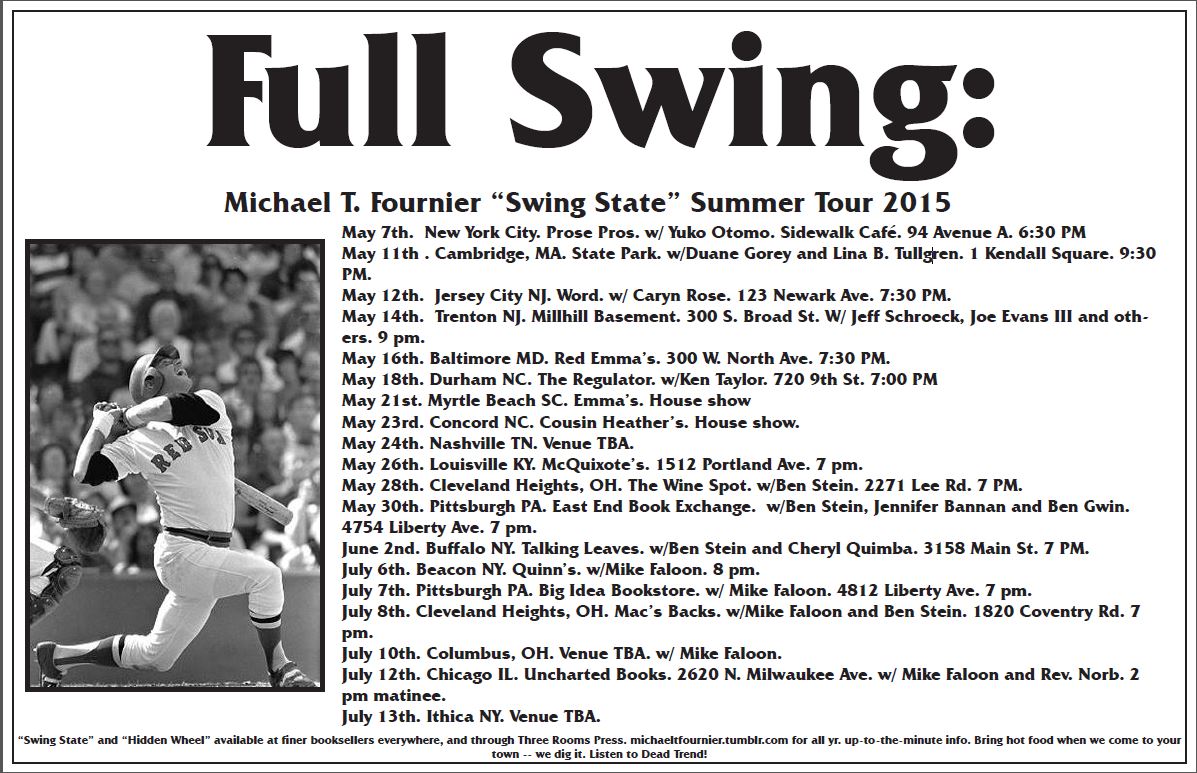"Safe" review for Chicago Review of Books
I reviewed Ryan Gattis's new novel for Chicago Review of Books.
I reviewed Ryan Gattis's new novel for Chicago Review of Books.

Full Swing 2015 summer tour. Get psyched!

Yo Boston: I’ll be reading with Sarah Gerard Feb 6th at Arlington Centered. Plus free tequilla. Do it!
thanks to Foreward Reviews for this great ‘Swing State’ review.
Review of Swing State (978-1-941110-08-9): Unembellished prose details the bleak nature of PTSD in this character-driven novel. Pulling yourself up by your own bootstraps is the American way. But what if you can’t? What if those straps fall too short, or fall off completely? Michael T….
I’m selling copies of my new novel “Swing State” to raise funds for a 2015 U.S. tour. I’d be stoked if you could contribute.

My second novel ‘Swing State’ will be published this fall by Three Rooms Press.
My debut novel is now available for Kindle, thanks to the nice folks at Three Rooms Press.
My West Coast tourdates. Thanks, as always. to John Mark.
I’ll be reading from “Hidden Wheel” at Satellite 66 at 7:30 PM on Thursday, March 15th: 66 6th Street.
GHOSTS IN THE MACHINE
A Review of Hidden Wheel A novel by Michael T. Fournier
(Trade paperback; Three Rooms Press, 2011.)
By Francis DiMenno
This is an intriguing fiction by the author of the 33 1/3 series monograph on the Minutemen's Double Nickels on the Dime. It is a short novel which is, in essence, a mock biography of two artists. Of course, nearly all fiction is a form of mock biography. But, ultimately, a novel is also a machine for explicating a philosophy. Hidden Wheel might be of particular interest to fans of Philip K. Dick, and/or Don DeLillo (not that the two are mutually exclusive). Devotees of Dick’s dark, dystopic works such as The Man in the High Castle and A Scanner Darkly would be likely to relish the author’s narrative strategy, a series of brief, skillfully arranged, quasi-documentary chapters in which the story of an eclectic arts scene is reassembled from the point of view of a chronicler writing centuries hence. Admirers of DeLillo novels such as Great Jones Street would likely find an affinity in the subject matter of Hidden Wheel, with its wide range of arts world characters, each one concisely sketched.
Protagonists include the dipsomaniacal Max, a half-reformed graffiti artist turned gallery pro, and Rhonda, a semi-reclusive chess prodigy with a sideline as a dominatrix-for-hire who spends her life assembling fewer than a dozen enormous, autobiographical canvases. The side cast includes a tax-dodging old-money gallery owner and “micro visionary” named Ben Wilfork; a scene-making editor of an arts magazine who calls herself Lara Fox-Turner; Bernie, a drummer reduced to taking some very odd jobs in order to buy a new kit; and Amy, a fading bass player still trading on her one-time affiliation with a widely revered (and wildly reviled) novelty act called Dead Trend.
The broad theme of the novel seems to be the evanescence of artistic endeavor in a digital age–and the central narrative revolves around the respective fates of Max, the prolific and obsessively self-promoting minimalist, vs. Rhonda, the prodigy-genius whose lifespan-encompassing works take place on a far greater canvas. Max, the artist who floods the market with lazy, derivative work, considers himself a trendsetter to the very end. Rhonda, the capital-A Artist, is an ideological purist who is imperious and cold. The methodology of the novel partially mirrors its theme: the story is told with an ingenious collage of narrative techniques which in part replicate the subject matter.
Yet for all of its narrative inventiveness, this is also a novel which is grounded in the real world. Particularly interesting is its exposure of all manners of scams: self-promotion in the digital age; the marginally scrupulous business practices of arts promoters; the inside machinations of the media and its star-making machinery; and the venal strategies employed by corporate majordomos to promote dubiously “hip” brand extensions. But this is also a philosophic novel which gives the reader insights into the nature of the creative impulse; as such, it ought to be required reading for that class of artisans who also consider themselves cognoscenti, members of a select tribe known to marketers as “influentials.” This novel would also be of interest to those who want to know more about how such people operate and what really makes them tick. Hidden Wheel is not so much a hipster manifesto as a dissection of hip–we might even be talking about a new genre here, “meta-hip.” Three Rooms Press is an eclectic publishing house which has made a shrewd investment in what may well become an influential and pioneering literary work.
Wow! Thanks to Sebastian at New Artillery for this amazing review.
Thanks to Erin at Pagan Spirits for running this excerpt from my novel.